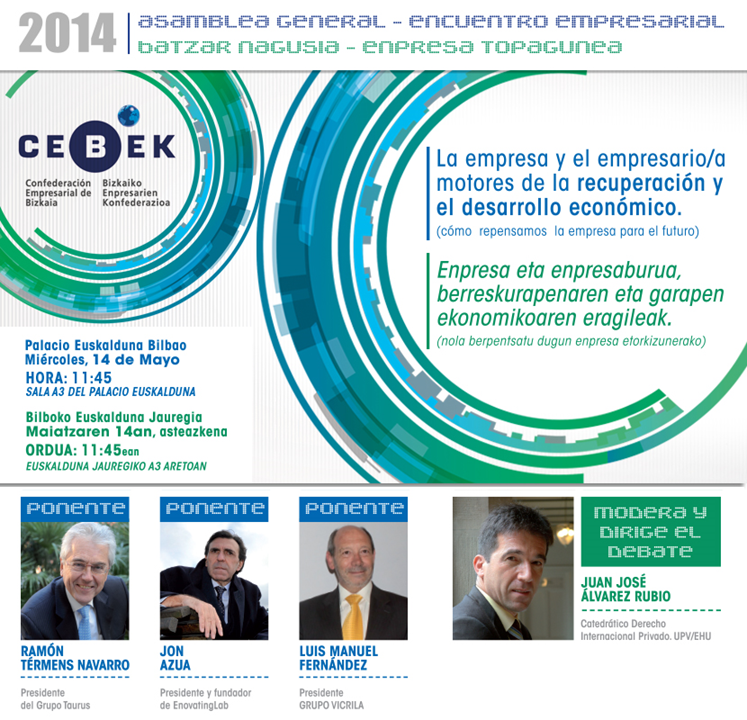
Considerations about the recovery and economic development, by Cebek
Participation of Jon Azua, President of Enovating Lab, in the Business Meeting organized by CEBEK
Yesterday, Wednesday May 14, Enovating Lab President, Jon Azua, participated in the General Assembly and Business Meeting of Cebek, the Business Confederation of Bizkaia. The event brought together an outstanding representation of the Basque business and institutional world, and focused on “The enterprise and the entrepreneur, engines of economic recovery”.
Together with Jon Azua, taked part in the business appointment Ramón Térmens Navarro, President of Taurus Group, Luis Manuel Fernández, President of Vicrila Group and Juan José Álvarez Rubio, Professor of private law in the EHU/UPV. The President of Cebek, Iñaki Garcinuño Zabala intervened as host and presentation of interventions.
You can check the details of the meeting on the Cebek website.
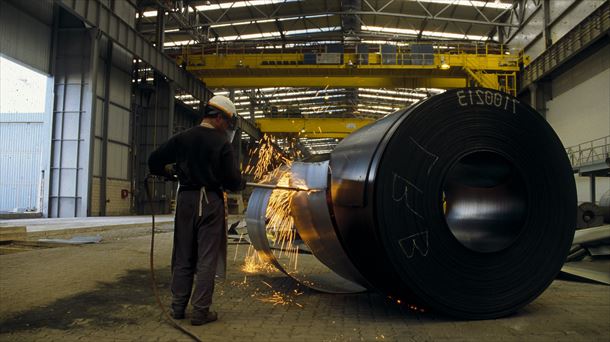
Basque industry has an opportunity with two billion new consumers
José Ignacio Arrieta and Jon Azua, ExMinisters of Industry and Energy of the Basque Government, Eduardo Arechaga, Economic Director of Confebask and Josetxo Hérnandez Duñabeitia, Manager of ASLE, analyzed the bases to maintain and promote the Basque Industrial sector
Despite the crisis, the Basque industry remains the main Basque economic development lever. The industrial policy of the last 30 years, and the prospects for the future that offers, are some of the topics on which the Deia diary has invited several experts, among them, the President of EnovatingLab, Jon Azua to reflect.
You can read the full article published in Deia diary on the following link: Basque industry has an opportunity with two billion new consumers.
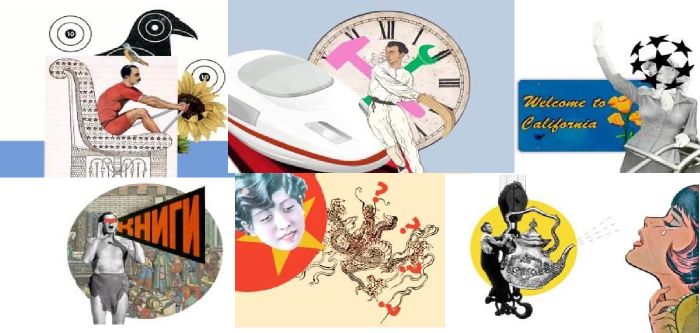
Rethinking the company
Presentation of #ESTRATEGIA00003 book published by B+I Strategy in which Jon Azua participates with the article entitled: “Rethinking the Company” (February 2014)
B+I Strategy presents in Bilbao his book #Estrategia00003, an appointment with “the frontiers of knowledge, collecting learning notes from our experience”, as can be read in the foreword. As in previous years, B+I equipment covers key concepts to understand business strategy by members of its network of collaborators, who contribute their vision to offer a coral look.
Jon Azua participates in this edition with an article about the challenges of enterprises in the New Economy.“Rethinking the Company” is the title of this collaboration, presented by its authors today at Deusto Business School.
More information about this publication in B+I Strategy.
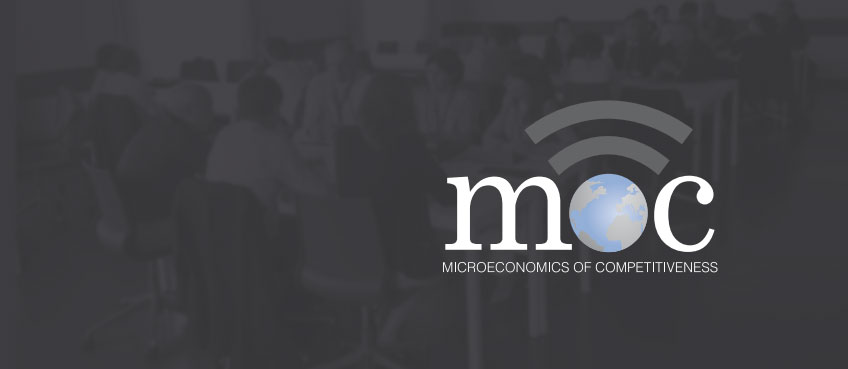
2014 edition of MOC Program
ORKESTRA, Basque Institute of Competitiveness offers its 2014 edition of the MOC (Microeconomis on Competitiveness) Program
ORKESTRA, Basque Institute of Competitiveness offers its 2014 edition of the MOC (Microeconomics on Competitiveness) Program. It is the international programme on competitiveness, clustering, and co-creation of value with greater world-wide prestige, under the coordination and promotion of the Institute for Strategy and Competitiveness of the University of Harvard, chaired by Michael E. Porter. The course is taught in more than 120 Universities of the World. Jon Azua, Professor of the MOC network, takes part as a teacher of this edition that will be held in Bilbao.
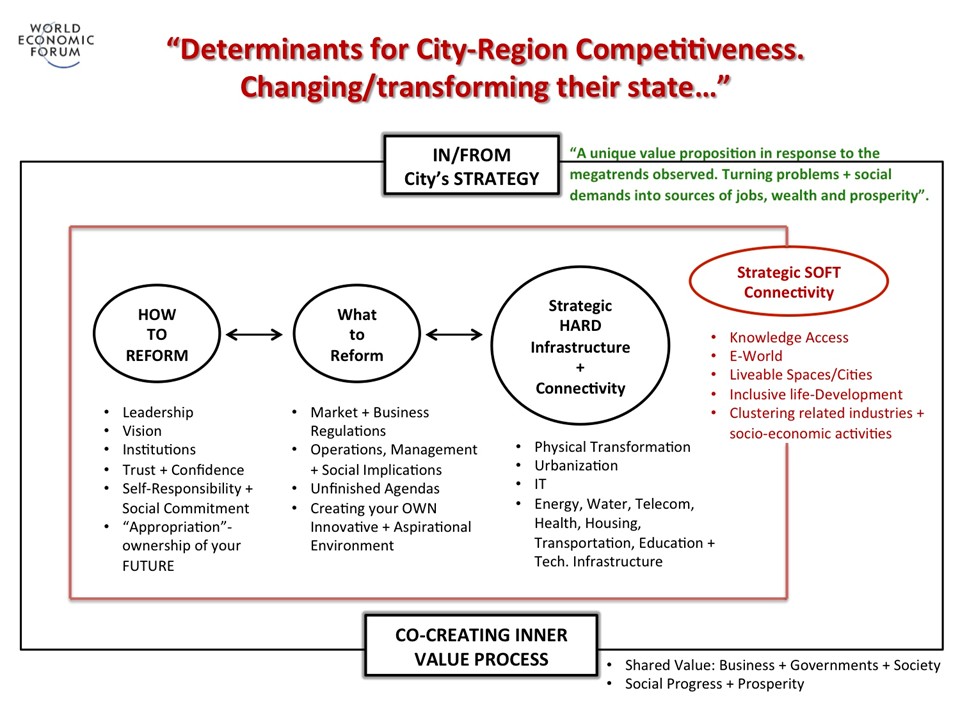
New Players: The Cities
Experts from around the world, discussed in Davos the contribution of cities in the new economic and social dynamics (January 2014)
Among the future key elements to rethink in the recent Davos meeting, the role and critical function of cities has been the subject of analysis and debate. From Global Advisor of Competitiveness Council, the World Economic Forum works in the definition of the taxonomy of the cities of success under a model that facilitates the realization of the unique value proposition of these new players in the economy of knowledge and well-being.
For more information about the role of these new players in the global economy, we invite you to know our vision and contributions.
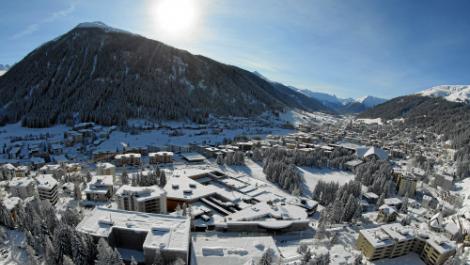
The “reorganization of the world” and its consequences
Forthcoming World Summit of World Economic Forum which will take place on 22-25 January in Davos (January 2014)
The World Economic Forum celebrates its World Summit from 22 to 25 of January in the Swiss city of Davos, looking at the implications of the economic, social and technological changes that are substantially changing our lives, communities and institutions.
Under the title “The Reshaping of the World: Consequences for Society, Politics and Business” and experts who will gather in Davos will offer a look about the mega-trends that are operating and, mainly, envelope the opportunities for social and economic development to countries, cities and businesses. The details of the agenda, personalities who have provided their attendance and other pieces of interest can be found in this video.
As members of this network, Enovating Lab has participated in previous sessions of discussion at the WEF, as part of our academic activity, enovating academiae.

Enovating Venture Plus México
A tool that complements the services of business projects promotion (December 2013)
The new society Enovating Venture Plus Mexico, S.A has been formally constituted in December 2013, dedicated to the promotion of business projects between Mexico and Euskadi.
The new society complements the activity of entrepreneurial initiatives promotion and advice, mainly in its early stages, vehiculiza through the investment tools of the group: Enovating Venture, S.L. and Enovating Venture Plus S.L, involving 50% Uliker S.L.
Through this new partnership, Enovating offers the unique real knowledge of both countries, their economies and dynamics.
More information: Enovating Venture
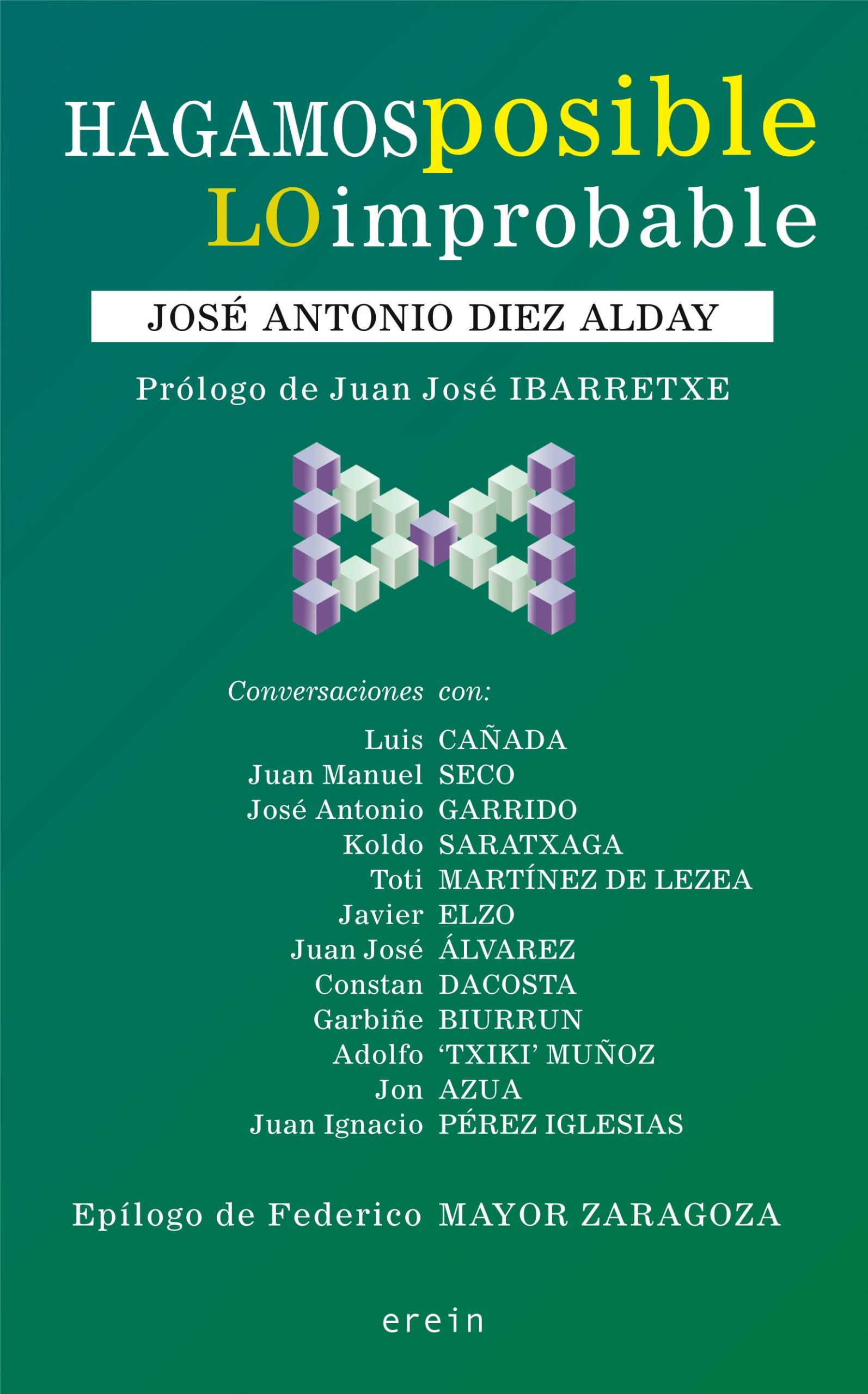
Hagamos posible lo improbable
Jon Azua collaborates in José Antonio Díez Alday journalist’s book (December 2013)
The journalist José Antonio Díez Alday has recently published a book of conversations with 12 personalities of political, social and Basque economic life, with the aim of provide some of the keys that will allow us to “back to the future with individual and collective responsibility to legitimate protests and propose viable alternatives”.
Jon Azua has participated in these dialogues with the author in a volume prefaced by Juan José Ibarretxe. Luis Cañada, Juan Manuel Seco, José Antonio Garrido, Koldo Saratxaga, Toti Martínez of Lezea, Javier Elzo, Juan José Álvarez, Constan Dacosta, Garbiñe Biurrun, Adolfo ‘Txiki’ Muñoz and Juan Ignacio Pérez Iglesias complete the list of collaborators, and Federico Mayor Zaragoza signs the epilogue.
“Hagamos posible lo improbable” has been published by Erein.
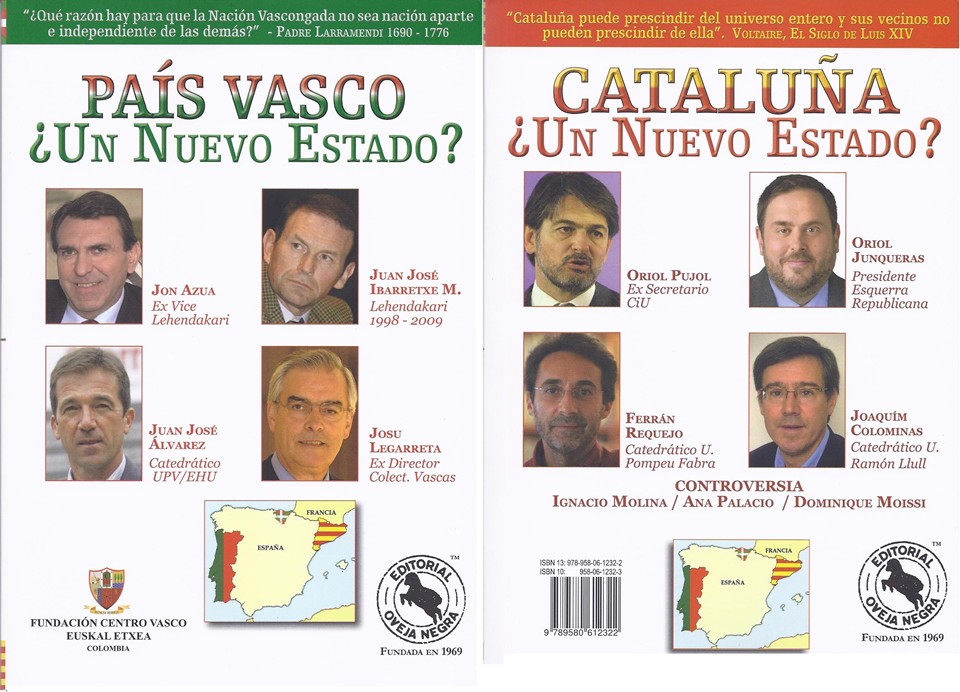
¿Hacia un estado vasco?
JON AZUA BRINGS HIS VISION ON THE FEASIBILITY OF A BASQUE STATE IN EUROPE IN A BOOK THAT DEALS WITH BASQUE AND CATALAN PROCESSES. (July 2013)
Is it feasible to have a basque state in today’s world? And a catalan state? Double answers to these questions are contained in the book “País Vasco ¿un nuevo estado?” and Cataluña ¿un nuevo estado?”, published by La Oveja Negra of Bogotá, in which four personalities develop the topics.
In the Basque part participate Juan José Ibarretxe, Jon Azua, Josu Legarreta and Juanjo Álvarez, and in the Catalan part Oriol Junqueras Oriol Pujol, Ferran Requejo, Joaquím Colominas.The volume provides, in addition, two appendages, called Controversies, which collects contrary opinions to basque and catalan states.
País Vasco: ¿Un Nuevo Estado? Publishing House Editorial Oveja Negra.
You can read the full article by Jon Azua at the following link:
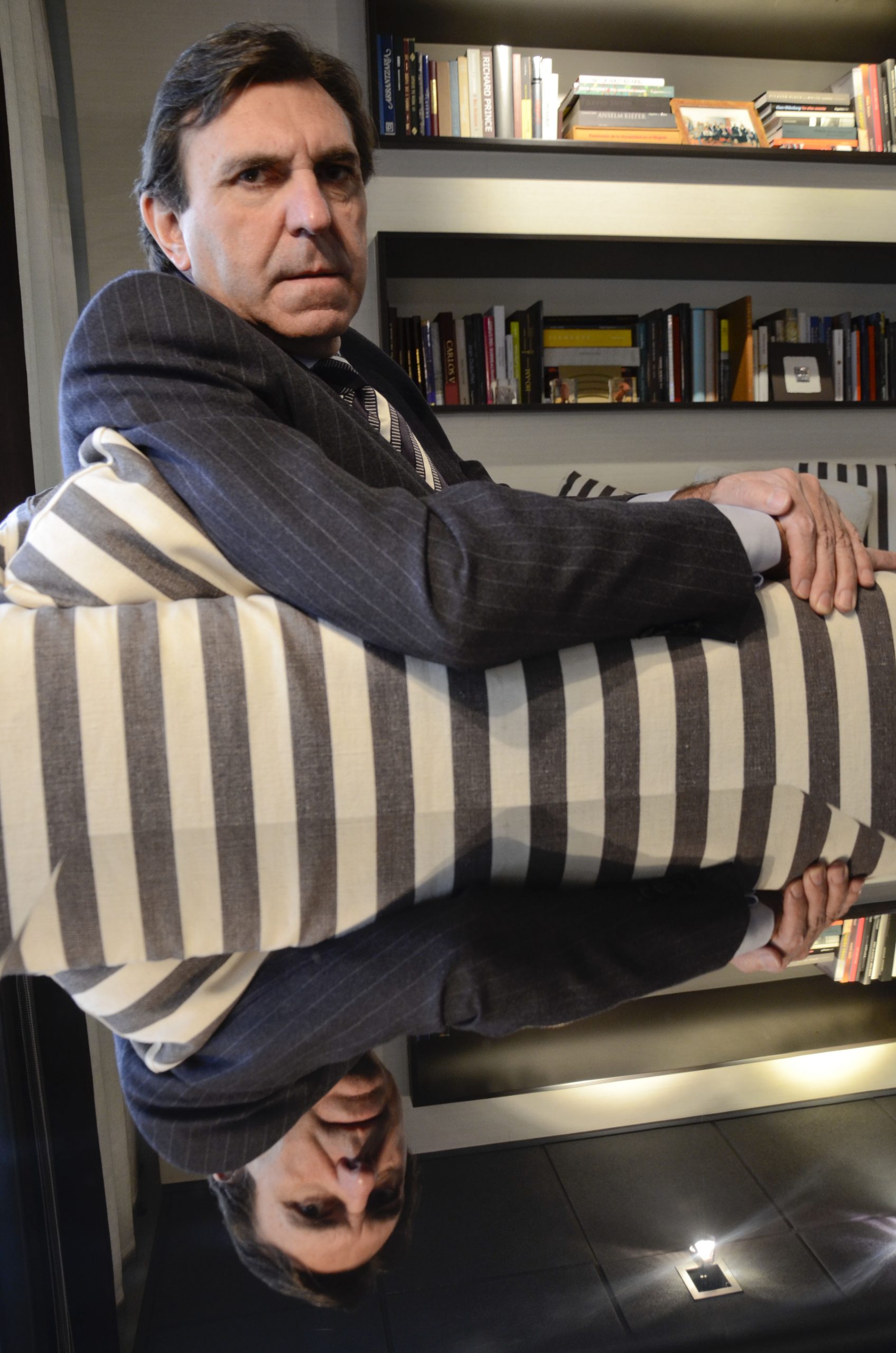
Interview – ESTRATEGIA EMPRESARIAL
“LA POLÍTICA DE CLÚSTERES ES MÁS ADECUADA HOY QUE HACE 20 AÑOS”. (March 2013)
Jon Azua, E-novating lab Chairman and Professor of the MOC’s Orkestra
El Instituto de Competitividad de la Universidad de Harvard que preside Michael Porter acaba de distinguir a Jon Azua como miembro del “Competitiveness Hall of Fame” por su “destacada contribución, tanto a su país como a la red MOC” (Microeconomics of Competitiveness). Impulsor de una nueva forma de entender la competitividad a través de la clusterización de la industria en Euskadi, 20 años después mantiene la vigencia de aquella apuesta que hoy considera más adecuada si cabe que antes.
Artífice e impulsor de la estrategia de competitividad que en los años 90 contribuyó a sacar a Euskadi de una profunda crisis, quien fuera vicelehendakari y consejero de carteras como Trabajo, Sanidad o Industria mantiene hoy, desde su actividad profesional en la esfera privada, un estrecho contacto con el ámbito de la competitividad como presidente del Consejo Asesor de Orkestra y de la firma de consultoría e-novating lab.
De 0 a 10, ¿qué nivel ocupa Euskadi en competitividad?
Me gustan poco este tipo de ranking porque pueden ser muy injustos en sus valoraciones, dependiendo del momento y las expectativas que se tenga. Y como mi expectativa es 10, puedo ser muy crítico con todo lo que queda por hacer. Pero si me dejo llevar por la percepción de otros países o regiones con respecto a cómo nos valoran, me situaría en un 7,5. Hemos hecho un larguísimo recorrido, muy positivo, aunque nos queda mucho por aprender y por avanzar ya que el éxito del pasado nunca justifica el éxito del futuro.
Como vicelehendakari y consejero de Industria fue usted uno de los artífices de la estrategia de competitividad de Euskadi en los 90. ¿Cree que aquella estrategia es valida hoy?
Estoy convencido de que es más adecuada si cabe que cuando la echamos a andar. Sus elementos esenciales son hoy más necesarios que nunca. Hace 20 años, la clusterización de la actividad económica fue el elemento natural de aproximación a la competitividad; sirvió para romper con el comportamiento de silo de los sectores clásicos, para pasar a ver la actividad de forma más abierta, con la etiqueta de global pero sin renunciar a lo local, sin aldeanismo ni proteccionismos, pero entiendo que cada sitio tiene su contexto competitivo y su desarrollo diferente.
¿Qué diferencia al modelo de competitividad vasco?
Lo verdaderamente diferencial del caso vasco es que ha pretendido ser una estrategia de País que conforma una base de referencia para sus propias políticas industriales, medioambientales, de desarrollo territorial, etc. En la actualidad, más de 20% de nuestras exportaciones corresponden a empresas clusterizadas; en torno a 1.500 personas trabajan hoy en torno a las asociaciones clúster dedicando su tiempo al debate, la discusión, la participación en proyectos, enriqueciendo permanentemente su propio trabajo y el del País. Es una riqueza que está ahí, que si hubiera que pagarla no habría presupuesto para ello pero que sin embargo, como contrapartida, exige una Administración pública con la que poder interactuar en la redefinición de estrategias, reposicionamiento de empresas, integración y coordinación de todos los agentes, etc.
¿Qué nuevos retos afronta Euskadi en esta materia?
Creo que hay que salir al mundo de manera más acompañada, colaborar con tu competidor, coopetir, sin renunciar a la propia estrategia. No hemos conseguido aún ese desarrollo competitivo de País. Tampoco en su momento conseguimos extender la clusterización a ámbitos de actividad que hoy todavía siguen siendo necesarios como el de la sanidad, la educación, el turismo o el mundo financiero. Se ha hecho alguna pequeña cosa en el área agroalimentaria; con el impulso del efecto Guggenheim algo se ha avanzado en el ámbito de arte, cultura y territorio; se ha hecho un largo recorrido en Puertos, aunque de una manera muy segregada; sería bueno dar un nuevo impulso a la sociedad Bilbao Plaza Financiera…
¿Ve disposición en el nuevo Gobierno para seguir avanzando en esta estrategia?
Creo que el Gobierno vasco está en la buena sintonía, aunque a mi personalmente me gustaría que lo estuvieses mucho más. Estoy convencido de que la consejera Arantza Tapia lo ve y cree en ello, pero me gustaría ver que eso se fortalece en su propio Departamento y se extiende más allá del mismo. Me encantaría un programa de competitividad que estuviera impulsado y presidido por el lehendakari, que pudiera incluir a la totalidad de departamentos del Gobierno y también a las diputaciones forales. Creo que tenemos una oportunidad en un momento en el que vuelve a estar de moda la competitividad y en el que el modelo vasco, con todos los matices que se quiera, está siendo utilizado como un elemento diferencial en Europa. Estamos en condiciones de pegar un nuevo impulso al desarrollo de este País.

